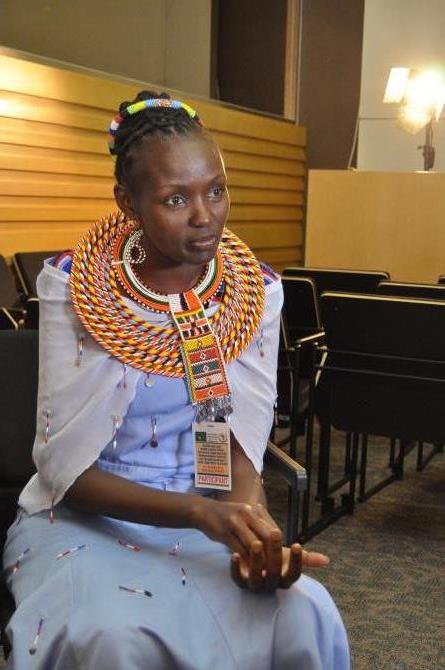From where I stand: “Women are our solution”
Date:

“Women and girls have an infinite potential to change the narrative. In our villages and communities, we must ensure girls go to school. The opportunities should be given by women, we should not wait for approval from men.
The Samburu Girl Foundation, located in Samburu in the north of Kenya, has fought against Female Genital Mutilation (FGM), early child marriage and the misuse of the beads business in exchange for sex, through its girls rescue centre.
We spend most of our time supporting and rescuing young girls in our community who are at risk of being married and abused. Many of the girls are forced to undergo FGM on the day of their wedding. We have cases of girls as young as 8-year-old who are forced to undergo FGM. FGM is illegal in Kenya and the Samburu Girl Foundation has in certain cases resorted to litigation to save the vulnerable children from FGM.
We believe these girls should be accepted back to the families and communities once rescued. Accordingly, we have supported education of young women and girls from primary school to university level before they go back to their families and community. We have tried to create the programmes that help the rescued girls be able to be accepted back home. The girls take our consultation programmes and go to school where they can learn, exercise, get into assembly and engage in intense empowerment programmes aimed at transforming their communities.
Child rights in Kenya is entrenched in the law, and the police can arrest perpetrators. However, in my society, culture is stronger than the law and most girls in Samburu do not go to school. I also went through some of these challenges when I was young, and my mother supported and protected me. Regardless of my mother’s early marriage at 16 years, she fought for me when I was about to be pulled out of school and made a bride. Since then, I started rescuing my own cousins.
At one point, I saved my 10-year-old cousin from getting married and cut and then the family replaced the bride with her 7-year-old sister. I went to the police and my uncle was arrested for this, but the community called me “crazy”. At this moment, I recognized the law on child protection and the police’s assistance on the issue. I also realized if I could have my uncle arrested, I can get the whole community arrested to stop early child marriage. I can now reach out to more girls. My biggest dream is to have girls freed from forced early marriage.
Involving men is critical in addressing some of these harmful practices. We however, still face challenges where men resist and are not willing to take lead in ending these harmful practices. Some of them do not understand the negative impacts of these practices only equating them to tradition and cultural ceremonies. Men often ask questions such as why they must follow the law because child marriage is a culture for them. However, I strongly believe they are the same people who should protect the law.
Funding has been another challenge for us. For instance, the grassroots organizations and NGOs like us write a proposal to the donors for funding but find a huge competition with the established international organizations. However, we are the one who know the issues on the ground better. We work with the most vulnerable women aged eight to twenty-one years. I believe the donors should assist with the empowerment and capacity building of grassroots organizations. It is the grassroots organizations that have solutions that are sustainable and transformative in nature.
Whereas strides have been made and there is potential for women’s leadership positions, Kenya has struggled with the basics of gender equality. Our parliament hasn’t yet been able to achieve gender equality and women’s leadership is not accepted in several communities. While women’s representation is mandatory in our parliament, many communities are saying, “Why don’t we just have a man to represent those women?”. They don't believe women can lead and this creates a gap in women’s leadership because of this cultural barrier.
On behalf of grassroots women, it is important to share the notion that everyone has potential to become anyone they want to be. Women have been complaining a lot about what women have gone through but we have not realized women have the solutions surrounding women issues. Women are our solution.
I would want women to challenge the obstacles and barriers that they and other women have gone through. For men, women need your support. If there are no women in men’s lives, there will be no success and transformation in society. Men cannot progress alone, they must be supported by their mothers and sisters. We all together have a lot of work to do for sustainable development, to realize the SDGs and Africa’s Agenda 2063 of which gender equality is a prerequisite.”